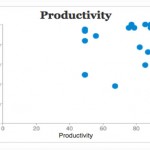Best Practices in Environmental Sustainability Performance: Siemens

With sustainability being a hot topic during the past few years, companies all over the world have been facing increasing pressure from all types of stakeholders to implement effective sustainability strategies that demonstrate positive contributions to environmental and social aspects, and to improve transparency in communicating these initiatives.
One company that has received recognition for its sustainability strategy and performance, especially in the environmental area, is industrial conglomerate Siemens. The firm was named the world’s most sustainable company in the 2017 edition of an annual sustainability ranking presented at the World Economic Forum in Davos, Switzerland, being particularly appreciated for its performance in energy productivity.
Siemens has been a member of the DJSI World Index of the Dow Jones Sustainability Indices for 17 years, ranking first in the industry in the economic dimension and second in the environmental area. The company has also been included in Financial Times Stock Exchange’s FTSE4Good series, comprising firms with strong environmental, social and governance (ESG) practices.
Siemens received an “A” rating for its climate change disclosure from the Carbon Disclosure Project (CDP), a nonprofit organization operating a global disclosure system for investors, companies and municipalities to manage their environmental problems.
The company defines sustainable development as “the means to achieve profitable and long-term growth”. At Siemens, sustainability is embedded into the company’s strategy and culture, an aspect highlighted through the central position it holds within the organization, as sustainability initiatives are considered an essential aspect of successfully implementing the Siemens Vision 2020 strategy program.
The Siemens Management Team includes a Chief Sustainability Officer, who is also a member of the Managing Board, directing the company’s sustainability activities as part of the corporate strategy. Siemens has also implemented comprehensive reporting procedures, publishing an annual sustainability report using several international reporting frameworks, such as the Global Reporting Initiative (GRI) G4 comprehensive reporting guidelines and the UN Global Compact principles.
Some of the initiatives through which the company implements its environmental sustainability strategy are its Environmental Portfolio, the Carbon Neutral Operations program, as well as environmental protection policies.

Siemens Environmental Portfolio
The company considers its Environmental Portfolio as its main contribution to mitigating climate change, environmental pollution and scarcity of natural resources. The portfolio comprises low-carbon and energy efficient products, systems, solutions and services in nine technology fields along the entire value chain of electrification, such as renewable energy, fossil power generation, energy storage, building technologies and healthcare.
The products rely on internal eco-design processes, adequate materials selection, efficient material use and reduced emissions in the production and utilization phase and life-cycle analyses. In fiscal year 2016, the Environmental Portfolio accounted for 46% of the company’s revenue from continuing operations.
Through these products and solutions, the company aims to help its customers reduce their CO2 footprint, cut energy costs and improve profitability by increasing productivity. In 2016, Siemens enabled its customers to save more than 521k # CO2 emissions in kt through products installed in previous years that are still in use.
Carbon Neutral Operations Program
Siemens has ambitious goals regarding its environmental sustainability agenda, aiming to become a carbon neutral company by 2030. To achieve this target, the company launched the Carbon Neutral Operations program in September 2015, focusing on 4 pillars:
1. Energy Efficiency Program
The company will invest more than EUR 100 million to improve energy efficiency at its sites, expecting to achieve EUR 20 million $ Energy cost savings per year once implementation is complete. Eleven such projects were started in 2016.
2. Decentralized energy systems
The company’s long-term target is to generate 10% # Electricity demand from distributed energy systems on site, including wind turbines, small gas turbines, solar panels, intelligent energy management systems and energy storage solutions. Decentralized energy systems also play an important part in the company’s new headquarters, a sustainable building with 90% lower # Primary energy consumption than previously and LEED Platinum certification.
3. Reducing fleet emissions
Siemens targets a reduction of approximately 30% by 2020 of # CO2 emissions from company car fleet, currently at 300,000 t CO2 per year, through the improvement of transport efficiency
4. Purchasing electricity from renewable sources
Siemens has been increasing its % Renewable energy share in energy and electricity purchased, with 50% of the company’s German sites using 100% green energy.
The company has already achieved a reduction of more than 440 # CO2 emissions in kt one year after launching its Carbon Neutral Operations program, being on track to reach its interim goal of 1,100 # CO2 emissions in kt per year in 2020, a 50% decrease compared to 2014.
Environmental Protection and Resource Conservation
Siemens is committed to improve its energy and resource efficiency and to meet the growing international requirements regarding environmental protection. The company has a comprehensive Environmental Protection, Health Management and Safety (EHS) management system in place for all its relevant offices and production facilities, following the requirements of the ISO 14001 standard.
Siemens has a goal of zero waste to landfill, with a few of the company’s locations already achieving a rate of 100% for % Recycled hazardous operational waste and % Recycled non-hazardous waste, such as its plants located in Newcastle, UK and Erfurt, Germany. This was achieved by switching to a single disposal company as a contract partner, which allowed for the simplification of the disposal process, higher discounts and lower annual landfill fees.

Siemens’ success story in environmental sustainability performance exemplifies a few factors that companies should take into account when implementing an effective sustainability policy with a positive impact on several stakeholder categories:
1. Take a holistic approach to sustainability – Siemens’s contribution in the environmental sustainability area has had such a great impact because of its focus on sustainable value creation, which involves evaluating and improving the impact of its activities on society as a whole.
Siemens approaches sustainability at a strategic level, implementing a top-down process, which enables the inclusion of sustainability in all activity areas. In addition to promoting a positive environmental contribution within the organization, the company promotes sustainable value creation through its product portfolio, enabling customers to have a positive environmental impact.
While this comprehensive approach may not be applicable to all industries due to the nature of the activity, companies should view sustainability as part of their corporate strategy and implement well-defined policies which are tailored to their needs and resources, complement each other and collectively enable a positive impact on both the environment and the organization.
2. Use KPIs to measure and improve performance – Setting accurate, clearly defined and measurable goals represents an important part of any strategy and a company’s sustainability strategy is no exception. KPIs are an easy and precise way to measure performance and their comparability enables organizations to identify problematic areas and implement initiatives to increase performance.
At the same time, the use of KPIs allows for more objective comparisons of sustainability performance among companies.
3. Call for accountability at every level – With sustainability embedded at a strategic level, there are several implementation points within an organization, at various levels, starting from the top management and down to the operational level.
Therefore, it is important for companies to have control mechanisms to ensure adequate implementation at each level. International standards, such as the ISO 14001 standard implemented by Siemens, can help ensure high quality is maintained throughout the organization.
4. Implement a transparent and effective sustainability reporting process – In addition to developing and implementing successful sustainability strategies, companies need to be able to communicate them adequately to all stakeholders, in order to ensure transparency and accountability. Sustainability reports represent an effective tool, enabling companies to communicate their initiatives and achievements in a well-structured manner and, at the same time, to foster comparability between companies.
There are several internationally recognized sustainability reporting frameworks which companies can use, including the Global Reporting Initiative Standards, ISO 26000, SASB Sustainability Accounting Standards and UN Global Compact. Organizations should select a reporting framework that best suits their objectives, resources and target audience, allowing them to find a balance between meeting stakeholders’ expectations in regards to sustainability-related information and managing the reporting task.
If you would like to learn more about environmental sustainability, check out our Top 25 Environmental Care KPIs of 2011 – 2012, our Top 25 Sustainability KPIs of 2011 – 2012 or our comprehensive KPI Compendium, which contains over 20,000 KPIs used in practice, in numerous industries and functional areas. If that is not enough for you, our world class online repository, smartKPIs.org, stands as the world’s largest database of documented KPIs.
Image sources:

Tags: Organizational Performance, Siemens, Sustainability performance





